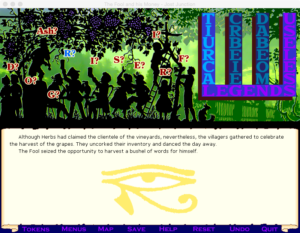The Fool and his Money
 I suppose my experiences with Games Interactive and its sequel left me craving an actually good puzzle game along the same general lines. I reinstalled The Fool and His Money over the weekend, and since then it has absorbed enough of my free time that I haven’t gotten around to posting about it. I’m in that mode where I wake up in the morning and say “Let’s try to make just a little more progress in this game before going to work”. That hasn’t happened in a while.
I suppose my experiences with Games Interactive and its sequel left me craving an actually good puzzle game along the same general lines. I reinstalled The Fool and His Money over the weekend, and since then it has absorbed enough of my free time that I haven’t gotten around to posting about it. I’m in that mode where I wake up in the morning and say “Let’s try to make just a little more progress in this game before going to work”. That hasn’t happened in a while.
Before I get into the details of the game, it’s worth recounting its history. In 2003, Cliff Johnson, author of the classic Tarot-themed puzzle game The Fool’s Errand, announced that he was working on a sequel, and accepting preorders. This was years before Kickstarter; it was crowd-funded the hard way. The game was repeatedly delayed over the following years, prompting jokes about the appropriateness of the title, but finally saw release in 2012, nine years after announcement. For comparison’s sake: Duke Nukem Forever was released 13 years after it was announced. It did, however, beat TFaHM to market.
I was among the preorderers, and played the game for a while after its release, but 2012 was this blog’s first major slowdown, coinciding with a major project at work. So I didn’t get around to posting about TFaHM at the time, and neither did I get around to finishing it. I’m hoping to correct both of those things now.
My first obstacle to starting the game was that the hard drive I had installed it on was kaput. I don’t have it on physical media, and it’s not on Steam. This is a game that was distributed via the author’s personal web site. Fortunately, that web site is still operational, and I still have the email containing my personal key file and password for it. It seems strange to have to manually apply DRM for a specific game today, when most games are either on a platform that handles it unobtrusively, or simply released DRM-free, as developers decide that it doesn’t help their sales enough to be worthwhile. Heck, just a few days ago, Blendo Games released the source code for Quadrilateral Cowboy, a game that had only been released two weeks previously. And why not? It’s a quirky indie game from a developer with a cult following; it probably saw most of the sales it’s ever going to have in the first two days, let alone two weeks.
It may sound like I’ve just gone off on a tangent, but it’s very easy to read the story of TFahM as being some kind of metaphor for intellectual property law. First of all, the treasures that the Fool accumulated over the course of his Errand are stolen by pirates. Then he finds that the people of the Four Kingdoms have unaccountably fallen into a sort of mania for Wordage, a system wherein people own specific words and can charge money for their use — although the one time the Fool uses a word in the presence of its licensor, he doesn’t pay anything because it’s considered too much effort to figure out how much he owes. The Fool has the unique ability to pull unowned words out of the air by solving puzzles, prompting a flurry of bidding from whoever’s around. But any gold that the Fool obtains this way is somehow magically siphoned away by the pirates. But I haven’t gotten all the way through the story yet, so I don’t know how well this holds up in the long run.
 Comments(0)
Comments(0)